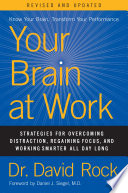

The book delves into the structure and functions of the human brain, emphasizing how different parts of the brain are responsible for various cognitive tasks. The prefrontal cortex, for instance, is crucial for decision-making, problem-solving, and controlling impulses. The authors illustrate how understanding these functions can help individuals manage their cognitive resources more effectively, leading to improved focus and productivity. By recognizing the limitations of our cognitive capacity, readers can learn to prioritize tasks, minimize distractions, and create environments conducive to deep work. This foundational knowledge is essential for anyone looking to optimize their mental performance in both personal and professional settings.
Continue readingCognitive overload occurs when the brain is overwhelmed with information and tasks, leading to decreased performance and increased stress. The authors explain how multitasking can exacerbate cognitive overload, causing a decline in productivity and creativity. They provide strategies for managing cognitive load, such as breaking tasks into smaller, manageable parts, focusing on one task at a time, and taking regular breaks to recharge mental energy. Understanding cognitive overload is crucial for professionals in high-paced environments, as it helps them recognize when they are at risk of burnout and equips them with tools to maintain their mental well-being.
Continue readingEmotions play a significant role in how we make decisions, often influencing our judgment more than we realize. The book discusses the interplay between rational thought and emotional responses, highlighting how emotions can enhance or hinder decision-making processes. The authors suggest that being aware of one's emotional state can lead to better decision-making outcomes. Techniques such as mindfulness and emotional regulation are introduced as ways to manage emotions effectively. This insight is particularly valuable for leaders and professionals who must navigate complex interpersonal dynamics and make high-stakes decisions under pressure.
Continue readingSocial connections are vital for cognitive function and overall well-being. The authors emphasize that collaboration and communication with others can enhance creativity and problem-solving abilities. They discuss the brain's social networks and how positive relationships can foster a supportive work environment. By nurturing social connections, individuals can benefit from diverse perspectives, share knowledge, and create a culture of innovation. This idea is especially relevant in today's interconnected workplaces, where teamwork and collaboration are essential for success.
Continue readingMindfulness practices are presented as effective tools for enhancing focus and reducing stress. The authors explain how mindfulness can help individuals become more aware of their thoughts and feelings, allowing them to manage distractions and maintain concentration on tasks. Techniques such as meditation, deep breathing, and mindful observation are discussed as ways to cultivate mindfulness in daily life. The emphasis on mindfulness is particularly pertinent in fast-paced work environments, where maintaining focus amid constant distractions is a significant challenge.
Continue readingThe book explores the science of habits and how they influence behavior and productivity. The authors explain the habit loop, which consists of cue, routine, and reward, and how understanding this loop can help individuals develop positive habits and break negative ones. They provide practical strategies for habit formation, such as setting clear goals, tracking progress, and creating environments that support desired behaviors. This knowledge is crucial for anyone looking to enhance their productivity and achieve long-term success, as habits play a significant role in shaping daily routines and overall performance.
Continue readingA growth mindset, characterized by the belief that abilities and intelligence can be developed through effort and learning, is essential for personal and professional growth. The authors discuss the importance of resilience, adaptability, and a willingness to embrace challenges as opportunities for learning. They provide strategies for cultivating a growth mindset, such as seeking feedback, reflecting on experiences, and setting learning goals. This idea resonates with individuals seeking to advance their careers, as it encourages continuous improvement and a proactive approach to personal development.
Continue readingThe reading time for Your Brain at Work, Revised and Updated depends on the reader's pace. However, this concise book summary covers the 7 key ideas from Your Brain at Work, Revised and Updated, allowing you to quickly understand the main concepts, insights, and practical applications in around 22 min.
Your Brain at Work, Revised and Updated is definitely worth reading. The book covers essential topics including Understanding the Brain's Functions, Cognitive Overload and Its Impact, The Role of Emotions in Decision-Making, providing practical insights and actionable advice. Whether you read the full book or our concise summary, Your Brain at Work, Revised and Updated delivers valuable knowledge that can help you improve your understanding and apply these concepts in your personal or professional life.
Your Brain at Work, Revised and Updated was written by David Rock.
If you enjoyed Your Brain at Work, Revised and Updated by David Rock and want to explore similar topics or deepen your understanding, we highly recommend these related book summaries:
These books cover related themes, complementary concepts, and will help you build upon the knowledge gained from Your Brain at Work, Revised and Updated. Each of these summaries provides concise insights that can further enhance your understanding and practical application of the ideas presented in Your Brain at Work, Revised and Updated.